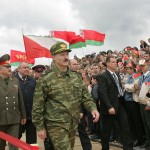

Damon Wilson and David Kramer recently gave they account of how the United States pressure resulted in Belarus regime’s release of political prisoners. David Kramer was the key figure in George W Bush administration responsible for dealing with Belarus. It is interesting to see different approaches of the United States with their principled stand and the Realpolitik of Germany. According to Wilson and Kramer, the German embassy in Minsk was trying to strike a deal with Belarus authorities to let Alexander Kazulin, a former Belarus presidential candidate, quietly go into voluntary exile. Kazulin rejected that offer and was subsequently released without any conditions following the US pressure.

In the world dominated by the “clash of civilizations” rhetoric and memories of bloody nationalist wars, nationalism is considered dangerous. However, the sentiment has become a highly positive phenomenon, and even, to an extent, a requirement at the international summer school “Belarus in the European Context: Current Discussions on Nation-Building,” organized by the Institute for Historical Research on Belarus and Philosophy Department of the European Humanities University (EHU) last week. Opening the school on August 2, Zahar Sybeka of Belarusian State Economic University said, tongue-in check, that all school participants were “nationalists.” The following six days proved him right as they showed their passion for the Belarusian culture and history and their concern about the country’s future. Fittingly, the school was held in “Kernavės Bajorynė”, next to the highly symbolic UNESCO World Heritage Site that has become a treasure trove for archeologists. The event brought together intellectuals from Belarus, Poland, Latvia, Russia, and Lithuania to debate the development of Belarusian identity and the Belarusian national idea. The researchers also discussed the role of social groups in cities and villages, the role of history and memory in Belarus’ national identity, as well as the issues of nationalism, Europeization, and democratization.

It is hard to say who will become Belarusian president after Lukashenka, but it is easy to predict what kind of political system will be left in Belarus. Although there was no massive violence, the authoritarian rule in Belarus has leveled the playing ground of Belarusian politics.

Recent Russia-Belarus information conflict is still attracting attention of leading international media outlets. The latest dispute broke out in June when Russia and Belarus tussled over natural gas prices, and continued when Mr. Lukashenko nearly scuttled a planned customs union between his country, Russia and Kazakhstan that had been a pet project of Vladimir V. Putin, Russia’s prime minister and pre-eminent leader. Michael Schwirtz of The New York Times* reflects on the mudslinging, which has played out in both countries’ government-controlled media in recent weeks.

I came to Minsk in order to brush up on my Russian before taking a language exam as part of my Master’s degree requirement at George Washington University. Now the reader may think, “Why would you go to Belarus in order to study Russian?” That would be a perfectly legitimate question if the reader is unfamiliar with Belarus, as is often the case in the West. The answer is because they speak Russian in Belarus, albeit with an accent, which I haven’t noticed. But then again for foreigners, it’s often difficult to pick up on nuances, cultural or otherwise. Belarusians often joke that politicians here speak Russian with a Belarusian accent in an attempt to gain the sympathies of the villagers, but such nuance is lost on me. In fact, the only politician I have heard publicly speak is the President, Alyaksandr Lukashenka.

Amnesty International has welcomed the release of Yevgeny Yakovenko, a conscientious objector who had been sentenced to one year in prison for “evading military service”. He was released under an amnesty marking the 65th anniversary of the end of the World War II. Earlier this year two other conscientious objectors have been acquitted. In what appears to be a positive trend Belarusian conscientious objector Ivan Mikhailau has been acquitted of the charge of “evasion of conscription measures.” On 4 May, Ivan Mikhailau’s case was heard for a second time by Minsk Regional Court and he was found to be not guilty. Amnesty International had been vocal on his case. This was followed on 31 May by another acquittal of a conscientious objector. Dzmitry Smyk, a Jehovah’s Witness who had been charged with avoiding mandatory military service was acquitted by central court in the Belarusian city of Homel. The judge commented: “Smyk’s actions do not constitute a crime.” VB

David Marples, professor at the University of Alberta, Canada and a President of the North American Association for Belarusian Studies is on the research trip to Minsk right now. In the article for the Jamestown Foundation * he reflects on possible outcomes of the Belarusian presidential election of 2011.

Andrej Sannikau, a potential candidate in 2011 Belarus presidential elections appeared on Hard Talk, the BBC World flagship current affairs interview programme. Stephen Sackur, BBC journalist who interviewed Mr Sannikau has made a few “hard” points, in particular to Mr Sannikau’s own personality. The journalist correctly pointed out that Mr Sannikau does not represent any major political organization in Belarus, just a well-run web site. Mr Sannikau also appears as an intellectual detached from the Belarusian population and is likely to have more friends in the West than in Belarus.

The Economist reports on the media war broken out between Belarus and Russia. One good thing about what is going on is that for the first time the public in Belarus and Russia can hear basically the truth about the neighbour’s government. Belarusians can get truthful stories about problems with freedom of speech in today’s Russia (see a report by the Belarusian TV channel STV here). On the other side, Russian TV tells the truth about Aliaksandr Lukashenka in its scandalous documentary The Godfather. Truth is such a rare thing for state media in authoritarian states like Russia and Belarus. Let’s hope we’ll see more of it as the conflict escalates.

Opposition leaders were unable to adopt a procedure for selecting a single presidential contender at their meeting in Minsk at the beginning of July, BelaPAN reported*. According to Uladzimir Kolas, chairman of the Rada (Council) of the Belarusian Intelligentsia (RBI), the process of selecting a single presidential contender had taken too long and might soon be of no use, as there would not be enough time for preparations to ensure an efficient and successful campaign. If the selection of a single candidate continues to be delayed, the RBI may withdraw from this process, Mr. Kolas noted. Two presidential candidates Alyaksandr Milinkevich and Ales Mikhalevich have refused to be involved in the process. Ales Mikhalevich was the first opposition candidate to launch his presidential campaign bid at a presentation on January 27, 2010 in Minsk*. The politician said he would rely only on Belarusian resources in his campaign. According to Mikhalevich, his team will comprise representatives of a new generation of the Belarusian society. He regards urban youth as his main support base. Mikhalevich is also the youngest candidate. He just turned 35 this May. Biography Ales Mikhalevich was born in Minsk in 1975 to a family of research associates of the National Academy of Sciences of Belarus. He attended the Belarusian State University, graduating in 1997 with a degree in Political Science and Law. While at university, Ales headed the Belarusian Students’ Association, a non-governmental organization dedicated to protecting the rights of Belarusian students. He also undertook periods of study at the University of Warsaw, Poland and University of Oxford, UK.

After June’s gas dispute and Russian enforcing Belarus to join the Customs Union, political tension between Minsk and Moscow persists, taking ever new turns and twists. Belarusian leadership retaliated for the film about Lukashenka shown on Gazprom-controlled NTV by meetings with conspicuous nemesis of Russia – president Mikheil Saakashvili of Georgia.

Poland and the Republic of Lithuania today officially celebrate the 600th anniversary of the battle of Grunwald. On July 15, 1410, the united army of Poland and the Grand Duchy of Lithuania have defeated the Order of the Teutonic Knights in the well-known battle. From 40 Lithuanian units at the battle 28, the overwhelming majority, were from the lands of modern Belarus and only 4 were from the territory of what is now the Republic of Lithuania. For obvious reasons, the Belarusian president Aliaksandr Lukashenka has not been invited to the celebration. However, several hundred members of Belarusian history clubs have taken part in reconstruction of the battle.
Russian major television channel NTV featured a movie “The God Father”. The movie depicts the story of mysterious disappearances of major politicians in 1990s and other human rights violations committed in Belarus recently. The documentary also emphasizes that Russia has spent enormous amounts of money to support the Lukashenka regime. According to the movie, Russian subsidies is the main reason for the “Belarus economic wonder”. The Belarusian president came in for some bruising criticism on 4 July, the official Belarus Independence Day, where he was portrayed as a dishonest, unscrupulous and ignorant dictator intent on holding onto power at all costs. The God Father movie (available below in Russian) is a clear sign that the Kremlin wants to put pressure on Lukashenka in the wake of presidential elections in Belarus.

Ivan Mikhailov, Dmitry Smyk and Yevhen Yakovenko – the three young men convicted since late 2009 of refusing compulsory military service on grounds of conscience – separately told Forum 18 News Service* that they want the proposed new Alternative Service Law now being drafted to introduce a fully-civilian service, not of punitive length and open to all conscientious objectors, whether religious or not. Mikhail Pashkevich of the group For Alternative Civilian Service insisted to Forum 18 that applicants for alternative civilian service should be able simply to inform the authorities of this decision without having to “prove” their entitlement. President Aleksandr Lukashenka’s instruction in February to draft Alternative Service Law came a decade after Belarus’ Constitutional Court ruled that introducing an alternative service was “urgent”.
